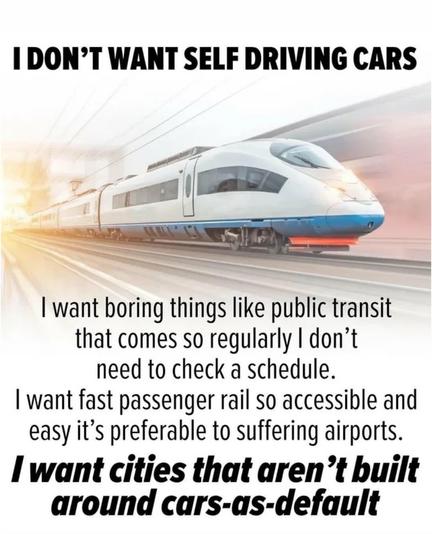| A 20th Century American Woman; Lifelong educator of language and culture; liberal. Firm believer that we get the government we demand. Demand more.Dog-hugging liberal, mother of men and dragons. Fighting for Democracy, justice, and human rights. I have | |
| Education is transformative. Born in SoFla, a product of the 70s. |
The BEST Words
- 61 Followers
- 82 Following
- 708 Posts
Is this too much to ask? Evidently it is. 😕
#Environment #Climate #ClimateChange #ClimateCrisis
#ClimateAction #WarOnCars #BanCars
In the latest statement from Sen. Dianne Feinstein, she indicates she plans to return to the Senate - w/ no timeline provided. It underscores the larger frustrations over lack of transparency about the her health. New story with @boreskes and @cam_joseph: https://www.latimes.com/politics/story/2023-05-04/dianne-feinstein-absence-transparency
Cartoon
Rooting for the mob... @TheBuffaloNews #tuckercarlson #democracy #bloodlust https://buffalonews.com/opinion/rooting-for-the-mob/image_a92c0032-ea7d-11ed-a3cc-535b4e753a9c.html
@BrentInMasto @panamared27401 @Oxymetheus @scottsantens
The richest people on the planet funded a global tax evasion scheme (tax havens, tax subsidies, tax loopholes) to avoid paying for even the smallest aspects of a social safety net.
Billionaires even buy golden visas, give up their citizenship, and become tax evasion migrants moving every few months to avoid the residency process of taxation.
The rich orchestrate tax free lives & inheritance. Who makes them pay taxes?
---
RT @Sulliview
🔥 Righteous indignation from one of our most essential columnists. Here’s @Will_Bunch on Jordan Neely, Tucker Carlson, and ‘rooting for the mob’ as America unravels https://w…
https://twitter.com/Sulliview/status/1654199736067411986
RT @KFILE
NEW: In posts on Facebook/Twitter, Mark Robinson, the GOP frontrunner for NC governor repeatedly mocked the survivors of the 2018 Parkland shooting in viscous terms calling "spoiled little bastards" and "prostitots."


